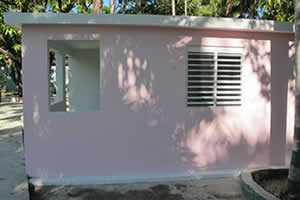Food For The Poor to Build 1,000 Homes in Haiti’s Northern Corridor
Untitled Document
COCONUT CREEK, Fla. (Aug. 21, 2013) – Food For The Poor signed an agreement on Tuesday with Haiti’s Fonds d’Assistance Economique et Sociale (Fund for Economic and Social Assistance) to build 1,000 homes in the northern corridor of Haiti. With the support of the Inter-American Development Bank and the United States Agency for International Development, this agreement will mean construction will begin in the fall and will take approximately 18 months to complete.
Food For The Poor and the other agencies have agreed on a regional development plan anchored by Caracol Industrial Park, which opened last October, and is located between Cap-Haitien and the border of the Dominican Republic.
Food For The Poor, with the support of its generous donors, will be responsible for the construction of the homes, which will include clean water and flush toilets. Each house will be powered with solar energy and will be built with earthquake and hurricane resistant materials. The homes will be located on three parcels of land within the Nord-Est Department of Haiti in the towns of Terrier-Rouge, Ouanaminthe, and Caracol. The industrial park will provide work for many of the families. Schools are nearby, and there’s an opportunity for future community-related projects.
It’s been more than three years since the earthquake devastated the epicenter of Haiti. During that time, Food For The Poor has been working to help earthquake survivors with their immediate and long-term needs. With the help of its donors it has built 4,136 two-room permanent homes. While 1.3 million people were initially left homeless by the earthquake, an estimated 279,000 remain without proper shelter, according to published reports.
“Since the quake, we have escalated our homebuilding in Haiti,” said Robin Mahfood, President/CEO of Food For The Poor. “It is heartbreaking to see the conditions in which some people are living, and it is dangerous to their health and safety. By working together with FAES, IDB, USAID, and with our loyal donors, we will be able to get more people out of the tents and move them into sturdy homes of their own.”
“These agencies want to work with Food For The Poor because the organization has worked in Haiti since 1986 and has demonstrated experience of getting results, which has earned the charity a great deal of trust,” said Alvaro Pereira, Executive Vice President of Food For The Poor. “Providing families with a home is important, but we also are committed to implementing community projects such as economic development training to become self-sustaining, and support services to train and empower families on how to maintain their homes in their new neighborhood.”
Food For The Poor, named by The Chronicle of Philanthropy as the largest international relief and development organization in the nation, does much more than feed millions of the hungry poor in 17 countries of the Caribbean and Latin America. This interdenominational Christian ministry provides emergency relief assistance, clean water, medicines, educational materials, homes, support for orphans and the aged, skills training and micro-enterprise development assistance, with more than 95 percent of all donations going directly to programs that help the poor.
Wanda Wright
Food For The Poor
Public Relations
954-427-2222 x 6079
wandaw@foodforthepoor.com

